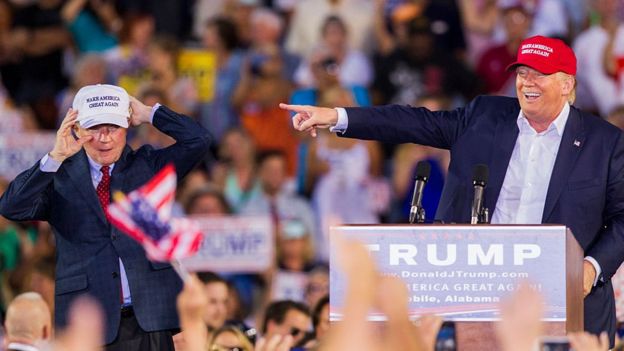Who will be Trump’s running mate?
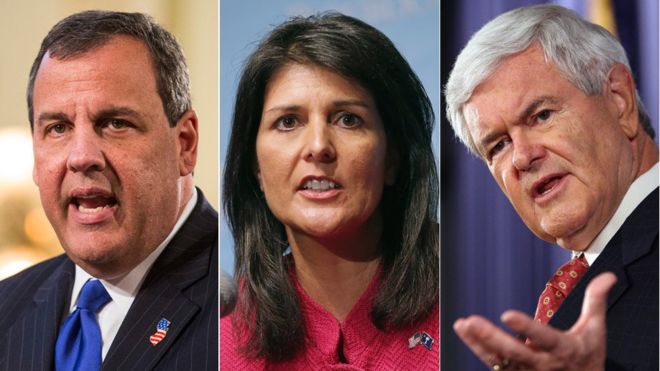
Now that Donald Trump has cleared the Republican presidential field and is poised to be his party's nominee, the next major piece of news out of his campaign could be whom he chooses as his running mate.
The vice-presidential selection is closely watched in part because it's one of the first opportunities for presidential candidates to demonstrate their decision-making skills under the national spotlight and emphasise the kind of characteristics they value in those who would serve in their administration.
More than that, however, the pick can also have electoral value. Past candidates have used their vice-presidential selection to address perceived shortcomings in their resume or play for support among key constituencies or battleground regions.
Barack Obama picked Joe Biden in 2008 to burnish his foreign policy credentials. Mitt Romney opted for Wisconsinite Paul Ryan in 2012 to appeal to mid-western voters and inject some youthful vigour into his campaign.
The Washington parlour game of guessing who Mr Trump will tab as his ticket-mate is already in full swing. A few prominent names have emphatically ruled themselves out. Others have not-so-emphatically done so. And there are some who are quietly manoeuvring for a place on Mr Trump's vice-presidential short list.
Here are the kinds of selections that are in play and a few of the names that keep surfacing.
The insiders
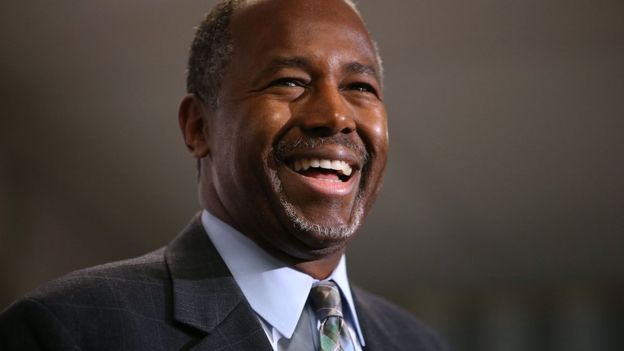
Mr Trump has said that he is looking for a running mate with "great political experience" who can work with Congress and help get his legislative priorities passed. If he wants a nuts-and-bolts, modern-day Lyndon Baines Johnson to his John F Kennedy, there are a number of possibilities — even though many in Congress, starting with House Speaker Paul Ryan, are not yet fully on the Trump bandwagon.
Alabama Senator Jeff Sessions was one of the first Republican office-holders to endorse Mr Trump, and he's taken a key role in the campaign as its top foreign policy adviser. While he has downplayed his suitability for the position, Mr Sessions has spent 20 years in Congress and is considered the architect of Mr Trump's immigration policies.
Former Speaker of the House Newt Gingrich is another Trump-friendly insider whose name has repeatedly surfaced. Although he's been out of Congress for nearly two decades, he had modest success as a presidential candidate in 2012.
Like Mr Trump, Mr Gingrich has a reputation as being a bit of a loose cannon prone to bombast. Unlike the New Yorker, however, he has a long track record as a cunning political strategist and policy expert.
Congresswoman Marsha Blackburn of Tennessee generated some buzz after saying in early March that she would consider being on Mr Trump's ticket. She is a favourite of conservative activists and holds high-level positions on several important congressional committees.
The vanquished
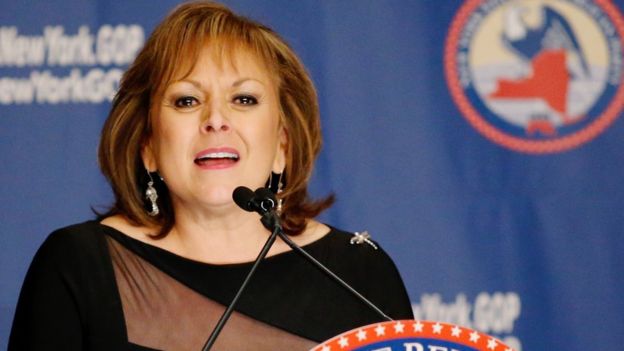
During a television interview last week Mr Trump said that there was "probably a 40% chance" he'd select his running mate from among his former presidential rivals.
Such a move can help heal wounds from a bitter primary process and assuage the concerns of factions that supported the defeated candidate.
There's certainly plenty of precedent for this kind of pick. Mr Obama chose Mr Biden.
John Kerry picked John Edwards. And if it's good enough for Ronald Reagan, who selected George HW Bush, it's good enough for any Republican.
Chris Christie is likely near the top of this list, given that he was one of the first mainstream Republican politicians on the Trump train with his headline-grabbing endorsement in early March.
Although John Kasich has disavowed any interest, Mr Trump said he'd be "very interested" in vetting him as his running mate. The Ohio governor has a lengthy resume in both state and national politics and could help Mr Trump in the mid-west, which likely will be a critical battleground in the general election.
Florida Senator Marco Rubio has also taken himself out of the running — despite having the potential to help Mr Trump with Latino voters.
"My previously stated reservations about his campaign and concerns with many of his policies remain unchanged," Mr Rubio said on Monday. "He will be best served by a running mate and by surrogates who fully embrace his campaign."
Although he had some nasty exchanges with Mr Trump in the death throes of his candidacy, Texas Senator Ted Cruz could also be a choice.
Mr Cruz, still fresh off his stinging defeat in Indiana, hasn't tipped his hand — but if he were on the ticket it could go a long way toward shoring up doubts about Mr Trump among hard-core conservatives and evangelical voters.
The diverse
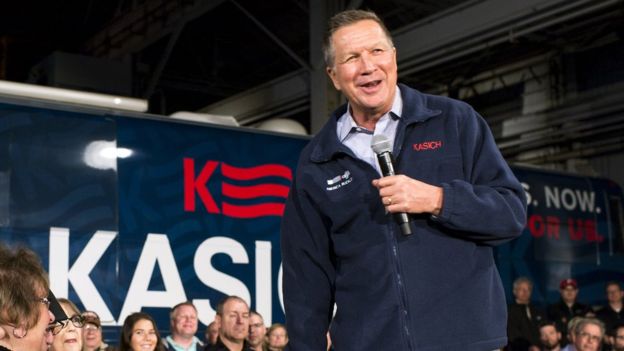
A good businessman knows that diversification is the key to long-term financial success. If Mr Trump wants to mitigate the risk in his general election campaign — namely his eye-popping negative ratings among Hispanics and women — his running mate could be one way to do it.
Oklahoma Governor Mary Fallin and former Arizona Governor Jan Brewer have both expressed interested in being on the Trump ticket. South Carolina's Nikki Haley used her State of the Union response earlier this year to indirectly criticise Mr Trump, but she's since said she will support him as her party's nominee.
New Mexico governor Susana Martinez — who as a Hispanic and a woman ticks two boxes — hasn't hinted whether she will endorse Mr Trump and has said she's not interested in a spot on his ticket, but that hasn't done much to diminish speculation about her chances.
If Mr Trump is looking for geographic diversity, Florida Governor Rick Scott — a former businessman and grass-roots Tea Party favourite — could fit the bill. Nevada Governor Brian Sandoval recently endorsed Mr Trump and could be a boon to Mr Trump among Hispanics in a key Western swing state.
The wild card
Nothing about Mr Trump has been conventional up to this point, so why should his vice-presidential pick be any different?
Instead of making a selection based on traditional factors like geography, ideology or demographic appeal, Mr Trump could opt for someone who re-enforces his outsider status.
Maybe he could stage his selection in the Trump Tower board room, like a political version of The Apprentice. If he asked the public to text their favourite candidate to his 900 number, the ensuing revenue might bankroll his entire campaign.
When precedent and decorum are discarded, the possibilities are endless.
Remember Sarah Palin? Many Republicans cringe when they recall her ill-fated 2008 vice-presidential bid, but Mr Trump beamed when she endorsed him last autumn.
She has said she doesn't want to be a "burden on the ticket", but that is far from an outright refusal to be considered.
If Mr Trump wants a military man to burnish his national security credentials, he could make a play for retired Marine Gen John Mattis, whose name surfaced when anti-Trump forces were looking for a possible independent candidate to rally around. He said no to their entreaties, but "Mad Dog" Mattis could find a spot on Mr Trump's ticket more to his liking.
MSNBC host Joe Scarborough has had a much-publicised cosy relationship with Mr Trump over the course of the Republican primary campaign, and the former congressman — who entertained notions of running himself last year — could decide to re-enter the political fray.
While the two have had a recent Twitter spat, Mr Trump seems all about letting bygones be bygones. He once said Ben Carson was akin to a child molester, and now the retired neurosurgeon is serving on his vice-presidential search committee.
Speaking of Mr Carson, he could follow the lead of Dick Cheney, who held a similar position for George W Bush in 2000, and conclude that he is his own best pick.
At the time the Cheney selection was considered quite shocking. Sixteen years later, it almost seems quaint.
Политика конфиденциальности | Правила пользования сайтом
